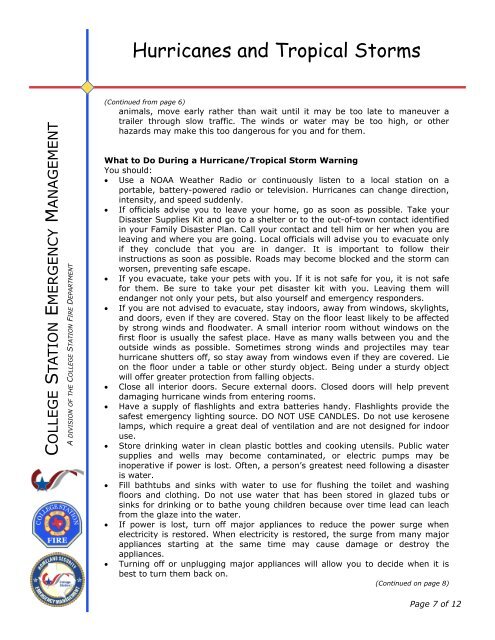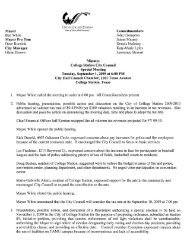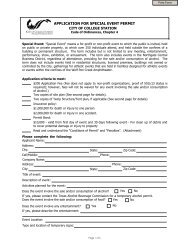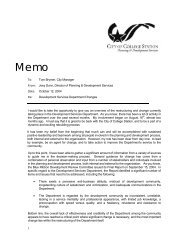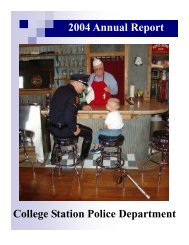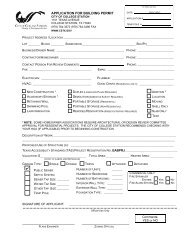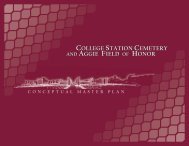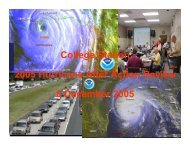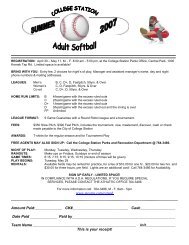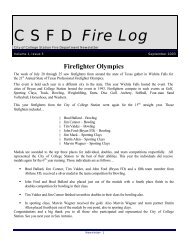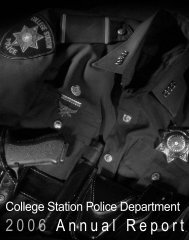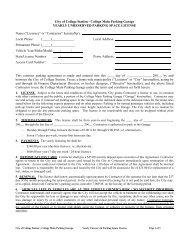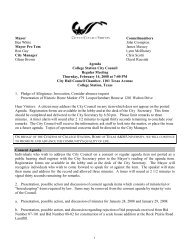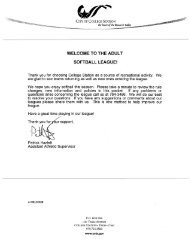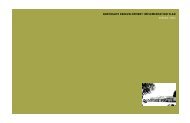Hurricanes and Tropical Storms - City of College Station
Hurricanes and Tropical Storms - City of College Station
Hurricanes and Tropical Storms - City of College Station
Create successful ePaper yourself
Turn your PDF publications into a flip-book with our unique Google optimized e-Paper software.
<strong>Hurricanes</strong> <strong>and</strong> <strong>Tropical</strong> <strong>Storms</strong><br />
COLLEGE STATION EMERGENCY MANAGEMENT<br />
A DIVISION OF THE COLLEGE STATION FIRE DEPARTMENT<br />
(Continued from page 6)<br />
animals, move early rather than wait until it may be too late to maneuver a<br />
trailer through slow traffic. The winds or water may be too high, or other<br />
hazards may make this too dangerous for you <strong>and</strong> for them.<br />
What to Do During a Hurricane/<strong>Tropical</strong> Storm Warning<br />
You should:<br />
• Use a NOAA Weather Radio or continuously listen to a local station on a<br />
portable, battery-powered radio or television. <strong>Hurricanes</strong> can change direction,<br />
intensity, <strong>and</strong> speed suddenly.<br />
• If <strong>of</strong>ficials advise you to leave your home, go as soon as possible. Take your<br />
Disaster Supplies Kit <strong>and</strong> go to a shelter or to the out-<strong>of</strong>-town contact identified<br />
in your Family Disaster Plan. Call your contact <strong>and</strong> tell him or her when you are<br />
leaving <strong>and</strong> where you are going. Local <strong>of</strong>ficials will advise you to evacuate only<br />
if they conclude that you are in danger. It is important to follow their<br />
instructions as soon as possible. Roads may become blocked <strong>and</strong> the storm can<br />
worsen, preventing safe escape.<br />
• If you evacuate, take your pets with you. If it is not safe for you, it is not safe<br />
for them. Be sure to take your pet disaster kit with you. Leaving them will<br />
endanger not only your pets, but also yourself <strong>and</strong> emergency responders.<br />
• If you are not advised to evacuate, stay indoors, away from windows, skylights,<br />
<strong>and</strong> doors, even if they are covered. Stay on the floor least likely to be affected<br />
by strong winds <strong>and</strong> floodwater. A small interior room without windows on the<br />
first floor is usually the safest place. Have as many walls between you <strong>and</strong> the<br />
outside winds as possible. Sometimes strong winds <strong>and</strong> projectiles may tear<br />
hurricane shutters <strong>of</strong>f, so stay away from windows even if they are covered. Lie<br />
on the floor under a table or other sturdy object. Being under a sturdy object<br />
will <strong>of</strong>fer greater protection from falling objects.<br />
• Close all interior doors. Secure external doors. Closed doors will help prevent<br />
damaging hurricane winds from entering rooms.<br />
• Have a supply <strong>of</strong> flashlights <strong>and</strong> extra batteries h<strong>and</strong>y. Flashlights provide the<br />
safest emergency lighting source. DO NOT USE CANDLES. Do not use kerosene<br />
lamps, which require a great deal <strong>of</strong> ventilation <strong>and</strong> are not designed for indoor<br />
use.<br />
• Store drinking water in clean plastic bottles <strong>and</strong> cooking utensils. Public water<br />
supplies <strong>and</strong> wells may become contaminated, or electric pumps may be<br />
inoperative if power is lost. Often, a person’s greatest need following a disaster<br />
is water.<br />
• Fill bathtubs <strong>and</strong> sinks with water to use for flushing the toilet <strong>and</strong> washing<br />
floors <strong>and</strong> clothing. Do not use water that has been stored in glazed tubs or<br />
sinks for drinking or to bathe young children because over time lead can leach<br />
from the glaze into the water.<br />
• If power is lost, turn <strong>of</strong>f major appliances to reduce the power surge when<br />
electricity is restored. When electricity is restored, the surge from many major<br />
appliances starting at the same time may cause damage or destroy the<br />
appliances.<br />
• Turning <strong>of</strong>f or unplugging major appliances will allow you to decide when it is<br />
best to turn them back on.<br />
(Continued on page 8)<br />
Page 7 <strong>of</strong> 12


